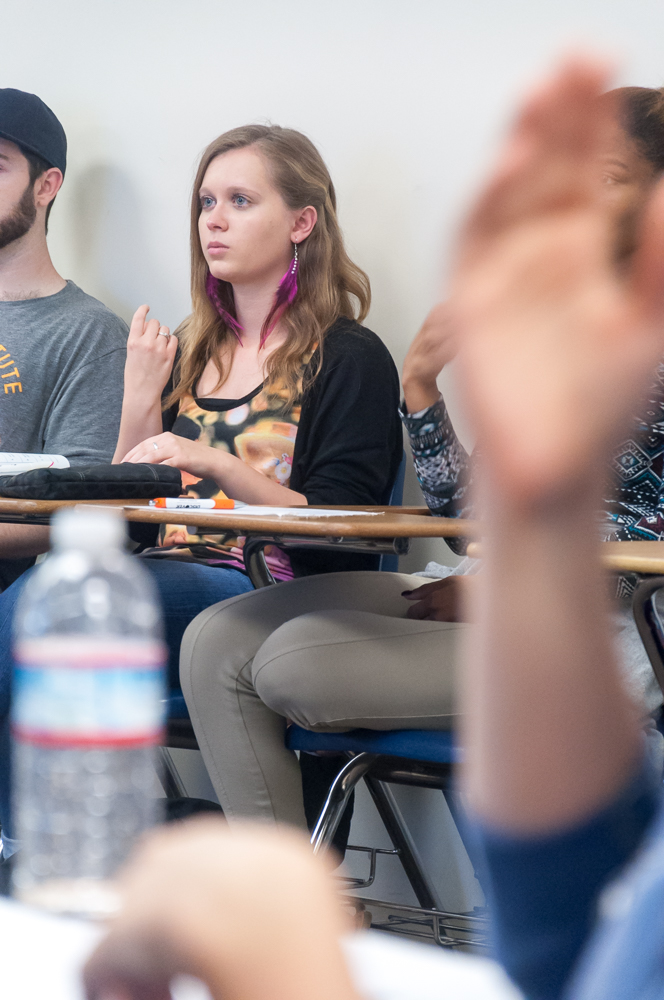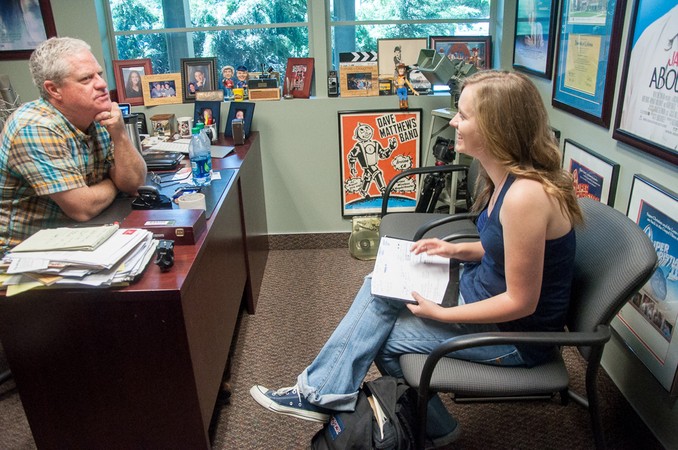The present-day Learning Center began in 2006, propelled by the work of two Biola staff members whose efforts started with a room full of boxes and hopes of developing a program that would aid students in need of accommodations. The center is now a combination of the past Disability Services and Learning Assistant Services departments.
“We never had contact with the people prior to us, we basically had to figure it out,” said Kevin Grant, assistant dean of student development. Grant’s ten years of experience working with students has contributed to his work, which generally deals with strategic oversight and development of the Learning Center, he said.
Jennifer Roode, director of the Learning Center, has partnered with Grant since the beginning. Her studies as a psychology major when she attended Biola University and years of communicating with students have given her insight into how to best care for students, she said.
“A lot of it in the beginning was learning by figuring out and the students coaching us as well,” Grant said.
Both have attended seminars and participated in webinars, as well as other types of training to hone their skills for developing the center.
ADVOCATION AND ACCOMODATION
The Learning Center’s mission statement on their website says their goals include providing reasonable and appropriate accommodations to students with psychological, medical, physical and learning disabilities, and ensuring legal compliance with state and federal disability law. The center advocates for students and facilitates with other departments across campus on students’ behalf.
The Learning Center provides three general categories of accommodation, which have increased significantly since 2006. Disability services cases are grouped together alongside temporary medical situations and organized in case format. When the center opened, they managed 86 cases. This year, the center registered 163 cases.
The second category includes students coming to the Learning Center for tutoring. The number of students signing up has nearly tripled since 2006, lending to the increase in student tutors the center employs as well, from ten to thirty this year.
Teaching the College Study Skills classes for students on academic probation is the third branch of services the center provides. In 2006, the center provided 8 sections over the course of the academic year, and this year offered 11 sections.
DESIRES FOR A MORE PROACTIVE STAFF
He expressed that although they have a large amount of student cases, they can still handle this workload. What they have communicated to people higher in the administration is that they are at a manageable level but getting close to that overload, Grant said.
June Hetzel, dean of the education department, considered the Learning Center in light of a recent meeting between disabled students and professors, during which the students shared their overall experience here at Biola.
“I think I heard almost every student describe that they felt like the Learning Center was understaffed, and that they wanted more than meeting ADA requirements. They wanted this staff to have time to call them and check on them, proactive about making sure their needs were met,” Hetzel said.
Hetzel said she has not had extensive experience working with the Learning Center, but while teaching through the years has periodically had a student come to her with a letter from the center. The accommodations and conversations that have accompanied those have been fairly straightforward, Hetzel noted.
“I have never personally, in 19 years of working here at Biola, ever received a complaint about the Learning Center, so this is the first time that I have heard that there were concerns, and the concerns were very serious,” Hetzel said, describing the recent meeting.
EVERY STUDENT MATTERS
The process of bringing a student into the Learning Center begins with an intake appointment. The Learning Center staff reviews a professional assessment for each student and then meets with them before producing a care plan, which includes coordinating with departments across campus.
“If something is not working, we welcome that feedback in order to improve service. In many cases, the students with the best experiences are those who express what is or isn’t working for them and we are able to make necessary modifications in their accommodation plan,” said Roode.
Roode further emphasized their decade-long commitment to hearing and addressing student complaints or concerns.
“No reasonable and appropriate accommodations have been denied — within the scope of university disability services — when accompanied by appropriate and timely documentation. At present, there are not open disability-related complaints that have been voiced to the Learning Center,” said Roode.
URGING STUDENTS TOWARDS SELF-ADVOCACY
Beyond that, the center expects the student to come to them if they need anything, or have a problem with the accommodation provided, said Roode.
“We can’t know unless we’re told that a student needs advocacy,” Roode said. The Learning Center promotes self advocacy, in an effort to prepare students for post-college life. Students remain largely responsible for their relationship with the center, she said.
Roode added that two Disability Student Services Effectiveness surveys have been conducted in the past three years, giving students the opportunity to assess the Learning Center. According to Roode, the response has been positive, with a high satisfaction rate among students.
“One issue that did arrive in the open-ended responses of the most recent survey was the need for additional proctoring space in regards to reduced-distraction testing. As a result, we have been working on this need since the summer and a new proctoring room is scheduled to open in the coming weeks,” she said.
SEEKING TO BETTER SERVE STUDENTS
Roode explained that the Learning Center continuously moves toward ADA awareness and further compliance across campus, regularly hosting webinar talks about ADA issues and trends and inviting other departments to join and discuss ways to work together.
“We recognize that this campus is not a perfect one but we do work towards greater accessibility and supporting students with disabilities each year,” she said.
Students who use the Learning Center’s services said they experience both struggle and success with getting their needs met, as well as accommodations received.
Sophomore film major April Caputi, who is profoundly deaf in her left ear and severely deaf in her right ear, requires special accommodations, including professors wearing a microphone that enables her to hear clearly and closed captioning while playing videos. Caputi said that she has had a good experience with the Learning Center overall.
“They have been very good with contacting professors in situations if I had a problem with a professor not wanting to wear a microphone. [If] that keeps happening then I tell them, and they will contact the professor for me,” Caputi said. “They have also been great at helping me pre-register for my classes.”
STUDENT TESTIMONIES
Senior intercultural studies major Kayla Nimigan has type three Ehlers-Danlos syndrome, which means the collagen in her body does not synthesize properly and impacts other systems in her body, causing chronic joint pain.
Nimigan said her previous experience working as a tutor for the Learning Center has helped her communicate with them now that she uses their services, due to her syndrome flaring up over the last couple of years.
Nimigan’s needs include more time to work on tests. She is given time and a half to complete tests, but says this accommodation has only helped to a certain extent.
The nature of her disability involves unpredictable onset of pain in her joints, so if this occurs during testing time, she would not be able to complete the test. There is no guarantee the pain will fade within a given period of time. This disability involves variables that the framework of the Learning Center is unable to accommodate, Nimigan said.
“For me, they’ve been willing to help but just unable to … It was helpful to have that time and a half … but it’s unrealistic to think that there will be a day where I won’t have pain and can kind of plow through and just get everything done … I’m not part of that cookie-cutter mold that they have laid out,” Nimigan said.
Junior sociology major Max Soh was born with retinitis pigmentosa, which impairs vision or completely blinds. RP manifests itself in varied ways — in Soh’s case, the condition has rendered him partially or legally blind. Soh emphasized that his experience has differed from other students, since each disabled student has a different case.
“I feel everything they’ve done, every aspect, there’s something great about it and something not so good about it. They’ve done a good job in hooking me up with the Print Shop, making sure I work with them,” Soh said.
The relationships and experiences students have with the Learning Center are unique to each individual, and have been both positive and negative. Variations in experience are due to each student’s needs and expectations, as Caputi, Nimigan and Soh expressed.
Students said they hope for enhancement of services provided by the center through increased and improved communication and collaboration. The Learning Center’s efforts over the years have paid off and they said they remain committed to promoting equal access through ongoing partnership with students, growing from a room full of boxes in to the resource it is today.








